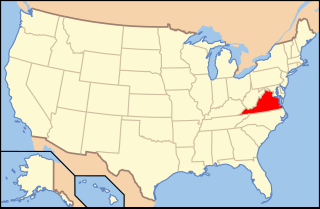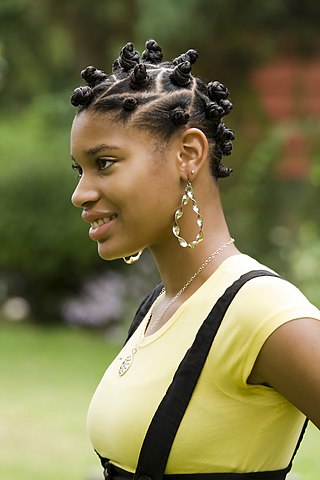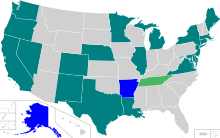
Dreadlocks, also known as dreads or locs, are a hairstyle made of rope-like strands of hair. This is done by not combing the hair and allowing the hair to mat naturally or by twisting it manually. Over time the hair will form tight braids or ringlets.

The afro is a hair style created by combing out natural growth of afro-textured hair, or specifically styled with chemical curling products by individuals with naturally curly or straight hair. The hairstyle can be created by combing the hair away from the scalp, dispersing a distinctive curl pattern, and forming the hair into a rounded shape, much like a cloud or puff ball.

Cornrows are a style of traditionally three-strand braids, originating in Africa, in which the hair is braided very close to the scalp, using an underhand, upward motion to make a continuous, raised row. Cornrows are often done in simple, straight lines, as the term implies, but they can also be styled in elaborate geometric or curvilinear designs. They are distinct from, but may resemble, box braids, Dutch braids, melon coiffures, and other forms of plaited hair, and are typically tighter than braids used in other cultures.

African-American hair or Black hair refers to hair types, textures, and styles that are linked to African-American culture, often drawing inspiration from African hair culture. It plays a major role in the identity and politics of Black culture in the United States and across the diaspora. African-American hair often has a kinky hairy texture, appearing tightly coiled and packed. Black hair has a complex history, culture, and cultural impact, including its relationship with racism.

Holly J. Mitchell is an American politician currently serving as a member of the Los Angeles County Board of Supervisors.

Lesbian, gay, bisexual, and transgender (LGBT) people in the Commonwealth of Virginia enjoy the same rights as non-LGBT people. LGBT rights in the state are a recent occurrence with most improvements in LGBT rights occurring in the 2000s and 2010s. Same-sex marriage has been legal in Virginia since October 6, 2014, when the U.S. Supreme Court refused to consider an appeal in the case of Bostic v. Rainey. Effective July 1, 2020, there is a state-wide law protecting LGBT persons from discrimination in employment, housing, public accommodations, and credit. The state's hate crime laws also now explicitly include both sexual orientation and gender identity.

Hair twists, flat twists, or mini-twists, are a hairstyle popular with Afro-textured hair around the world, and sometimes with other hair textures. The style is achieved by dividing the hairs into several sections, twisting strands of hair, then twisting two twisted strands around one another. They can also be created with one strand of hair at a time, with a comb. They are not to be confused with larger, longer dreadlocks,.

Randolph Bracy III is an American politician who is a member of the Florida Senate from the 11th district. Bracy's district includes parts of central and northwest Orange County. Bracy is the first African American to serve as Chair of the Criminal Justice Committee. As a member of the State Senate, Bracy pushed for the establishment of Juneteenth as a state holiday.
Discrimination based on hair texture, also known as textureism, is a form of social injustice, where afro-textured hair or coarse hair types, and their associated hair styles, are viewed negatively, often perceived as "unprofessional", "unattractive", or "unclean". This view can lead, for example, to some school students being excluded from class.

The Elliott-Larsen Civil Rights Act (ELCRA), or Public Act 453 of 1976, which went into effect in 1977, originally prohibited discrimination in Michigan only on the basis of "religion, race, color, national origin, age, sex, height, weight, familial status, or marital status" in employment, housing, education, and access to public accommodations. A ruling by the Michigan Supreme Court on July 28, 2022 expanded the scope of the law to explicitly include protections for LGBT people. Sexual orientation and gender identity were both formally codified and added to Michigan legislation officially on March 16, 2023 and became Act 6 of 2023. Other classes added to the law since passage include pregnant workers, workers who seek abortions, and hair style and texture.

Sydney Kai Kamlager-Dove is an American politician serving as the U.S. representative for California's 37th congressional district since 2023. A Democrat, she previously served in the California State Senate, representing the 30th district. She has also served in the California State Assembly and as a trustee for the Los Angeles Community College District.
The natural hair movement is a movement which aims to encourage people of African descent to embrace their natural, afro-textured hair; especially in the workplace. It originated in the United States during the 1960s, and resurged in popularity in the 2000s.

Braids are a complex hairstyle formed by interlacing three or more strands of hair. Braiding has been used to style and ornament human and animal hair for thousands of years in various cultures around the world.

The CROWN Act is a California law which prohibits discrimination based on hair style and hair texture by extending protection under the FEHA and the California Education Code. It is the first legislation passed at the state level in the United States to prohibit such discrimination.

Juanita Sandra Bartlett is an American politician and lawyer who has served as a member of the Maryland House of Delegates representing District 32 since 2019.

A protective hairstyle is a term predominantly used to describe hairstyles suitable for Afro-textured hair. These hairstyles are designed to minimize manipulation and exposure of the hair to environmental elements. Factors such as extreme temperatures, humidity, and precipitation can adversely affect hair health. Protective hairstyles are beneficial in mitigating these effects by keeping the hair tucked away and reducing its exposure to potentially damaging conditions.

Pamela L. Ferrell is an American entrepreneur, pioneer and advocate in the natural haircare field. She is best known for the pivotal role she played in assisting the United States (U.S.) Army and Navy with their review of hairstyle policies and regulations. She is the first known and documented African-American to help shape hair policies within the United States Armed Forces.
Esther Agbaje is an American politician serving in the Minnesota House of Representatives since 2021. A member of the Minnesota Democratic–Farmer–Labor Party (DFL), Agbaje represents District 59B, which includes portions of north and downtown Minneapolis in Hennepin County, Minnesota.

Rogers v. American Airlines was a 1981 legal case decided by the United States District Court for the Southern District of New York involving plaintiff Renee Rogers, a Black woman who brought charges against her employer, American Airlines, for both sex and race discrimination after she was dissuaded from wearing her hair in cornrows due to the airline's employee grooming policy. Rogers believed that this hair policy was a violation of her Title VII rights.

The Creating a Respectful and Open World for Natural Hair Act of 2022 was a bill in the United States Congress intended to prohibit discrimination based on an individual's hair texture or hairstyle by classifying such discrimination illegal under federal law. It applied to federally assisted programs, housing programs, public accommodations, and employment. The act was introduced in the House of Representatives by Congresswoman Bonnie Watson Coleman (D-NJ) on March 19, 2021. Senator Cory Booker (D-NJ) introduced a companion bill in the Senate on March 22, 2021. The CROWN Act of 2022 marked the second time the legislation was introduced in Congress.

















